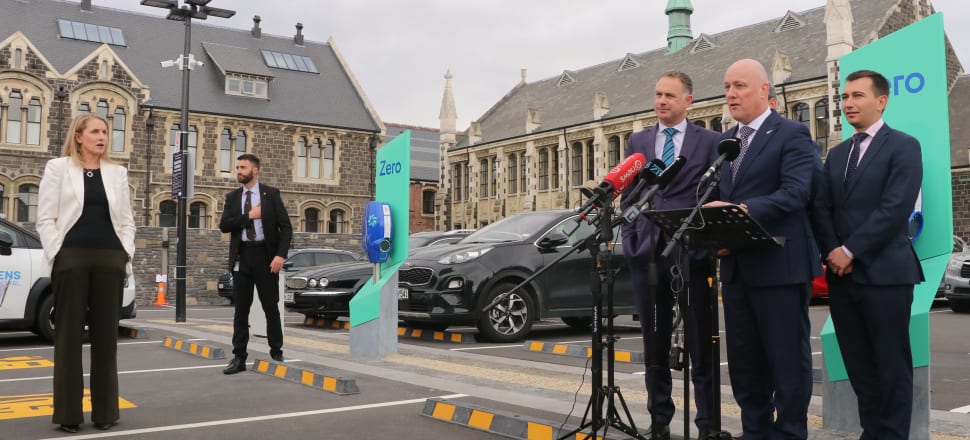
Christopher Luxon pledges to put a climate minister in Cabinet. Whoop-de-do, says Labour.
Opinion: Magicians use sleight of hand to create illusions.
Now, that’s not to say the National Party’s pledge to spend $257 million to ensure New Zealand has 10,000 public electric vehicle chargers by 2030, won’t eventually be a reality.
But this climate-focused policy relies somewhat on readers taking in headlines and not the detail.
A bit of “look over here, but not over there”, if you like.
READ MORE: * Labour and National kick climate can down the road * National cringes at climate spending
Christopher Luxon’s policy announcement in a windswept car park next to Christchurch’s Arts Centre does what it says on the tin – it accelerates the transition to electric vehicles by building the necessary infrastructure.
There’s a very real need.
Luxon says New Zealand languishes at the bottom of the OECD, with one public charger for every 95 EVs. Undoubtedly, there’s a shortage of EV chargers, especially in hard-to-reach places like the South Island’s West Coast and Tairāwhiti.
Range anxiety is a barrier for potential EV buyers, Luxon says.
Spot on.
But given what’s being taken away, National’s policy seems to have one foot on the accelerator, and the other on the brake.

Having more EVs on our roads is also important because our emissions from fossil fuel-powered vehicles make up almost 20 percent of overall greenhouse gas emissions.
Yet National is going to scrap the clean car discount – and the associated “ute tax” – which literally makes buying electric vehicles cheaper, and therefore more attractive to buy.
It’s a strong argument to say the price is more important to a purchase decision than the thing you plug it into.
Instead of being worried about range, it could be argued EV buyers are being short-changed by National. That’s certainly the political attack line.
(The Green Party says the Government plans to have charging hubs every 150-200 kilometres on main highways by 2028.)
National’s criticism of the clean car discount has been those who can afford electric cars – like Luxon’s wife, perhaps – don’t need a subsidy.
Yet the party is making a naked push for a greater uptake of EVs, arguing one of the biggest barriers is the lack of public charging stations.
“We’ve got to get our emissions down, and the way we do that is we accelerate the transition to EVs,” Luxon says.
Asked if National has a policy to encourage uptake of EVs among those who earn the least, Luxon says National thinks “the market is going to take care of that itself”.
In another case of climate switcheroo, asked about his party’s commitment to Paris Agreement targets by 2030, Luxon says it would look at its nationally determined targets but the “non-negotiable” commitment is to net carbon zero by 2050.
“We are going to meet our commitments and obligations,” Luxon says. He knows full well that a country whose emissions are not sufficiently reduced can choose to spend billions of dollars buying carbon credits, or funding emissions-reducing projects in other countries.
A seat at the table
Asked by Newsroom if National will commit to having a climate minister in Cabinet – unlike the current configuration under Labour with Green Party co-leader James Shaw outside of Cabinet – Luxon says it will.
“Climate change already is a very important portfolio, but if you think about how it’s going to be shaped and move forward over the future, it’s going to become increasingly a very economic portfolio that’s critical to everything that we do.
“So if you just think about the progression of the climate change agenda, and what a minister has had to deal with 10 years ago, versus five years ago versus today, and what they're going to need in five-10-15 years from now, it’s going to become a very important role.”
Newsroom asked Labour the same question, considering Shaw’s position outside Cabinet. Its response seemed to circle back to the magician argument, conjuring up the image of a wand being waved over an empty hat.
A spokesperson for Prime Minister Chris Hipkins says: “Labour is committed to climate change being front and centre of the next government’s agenda.
“Whether it’s inside Cabinet will be a matter for post-election negotiations. The Prime Minister is comfortable with the portfolio being in Cabinet, but doesn’t want to pre-determine any governing arrangements or requests from other parties.
“Unlike National, who has committed to cancel nearly every climate change policy Labour has in place and has no plan to achieve New Zealand’s climate targets, our next climate change minister will be given the mandate and tools to keep driving down emissions – whether they are in Cabinet or not.”
(National would push back on that, particularly given its plan to “cut red tape to drive a surge of investment in renewable electricity generation”.)
Asked at the Christchurch press conference if National was committed to lowering agricultural and transport emissions in its first term of government, Luxon deferred to climate change spokesman Simon Watts.
The party has committed to investing in research and development, he says, which will lead to supplements, a key method of reducing methane emissions from animals.
That’s not committing to reducing emissions, though, is it?
It is, Watts counters, because the supplements will reduce emissions – “and we’re going to support the investment in that in order to achieve that”.
Newsroom presses: Is he saying National is committed to reducing emissions from transport and agricultural emissions in its first term?
“That’s right,” Watts says. “And that’s what we’re doing as part of the announcement today in regards to providing the enablement infrastructure to allow people to transition to EVs.”
Sounds a bit like magical thinking, but it underlines National’s previous line it prefers to remove impediments rather than invest directly.







